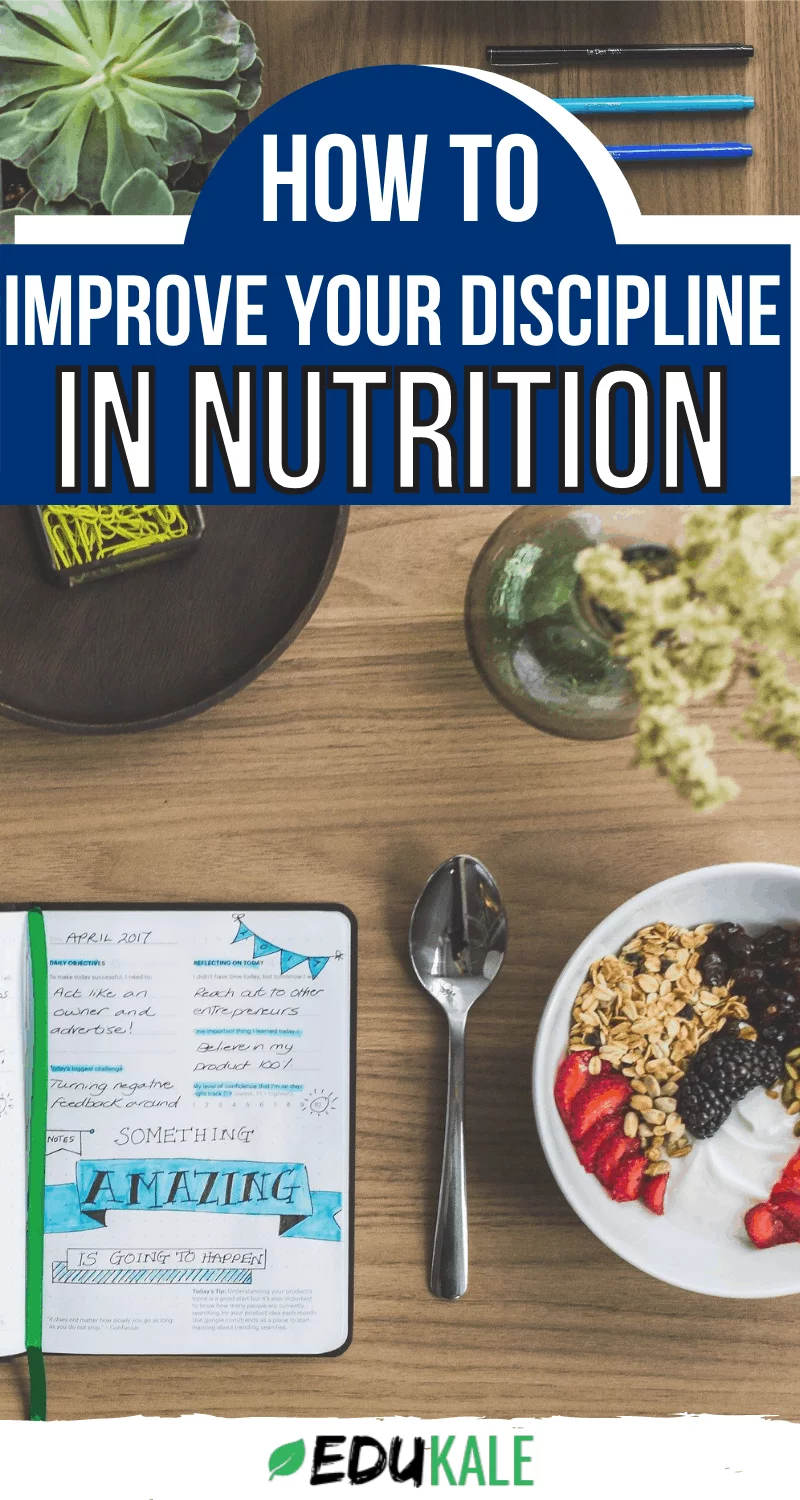This post contains affiliate links from which I may receive a small commission, at no extra cost to you. In no way does this affect my opinion or the information I provide on the product. Please read my disclaimer for more info.
Why is self-discipline regarding nutrition so difficult? Why is it so hard to stick to your healthy nutrition goals?
Many people wish to eat healthier or lose weight. However, most of them find that while they are able to eat healthily or exercise at first, as time goes by, they start to get back to their old habits.
Others are able to eat balanced meals some days, but MOST days it just seems impossible.
Why is this?
And how can you improve your discipline with nutrition?

Practice gentle discipline with nutrition.
Before getting into the tips to improve your discipline with nutrition, I want to clarify what I mean by discipline.
I don’t think that you should be too hard on yourself in regards to what you’re eating, unless you need to because you are a professional body-builder or need to be on a very specific diet for health reasons (or any other similar reason).
I believe that the best solution for optimal nutrition is to develop a healthy relationship with food and to practice mindful and intuitive eating. I don’t think that following a strict diet and then punishing yourself when you “slip up” is the best way to go about healthy eating.
So instead of feeling guilty about your food-related actions and penalizing yourself to improve your nutrition discipline, you should take the necessary steps to ensure that they don’t happen in the first place.
I believe that if you aim to eat intuitively, you will learn to listen to your hunger and fullness cues and there won’t be a need for discipline as we see it.
Intuitive eating is an evidence-based way of eating that promotes a healthy relationship with food. It focuses on your body’s internal cues instead of outside rules and restrictions. It’s based on ten principles, which involve honoring your hunger and fullness cues, making peace with food, respecting your body, and putting your health first.
Here’s an article I wrote on how to start intuitive eating for beginners, if you’re interested.

When you focus on doing this, you won’t have to “discipline” yourself per say because you’ll trust that your body is giving you the correct signals for it to operate optimally. But I completely acknowledge that reaching this stage may take awhile, and also that intuitive eating may not be the right solution for everyone.
So here are a few elements that could explain why you feel that you are lacking nutrition discipline (or self-discipline in any other field, for that matter), and some ways to overcome them.
You don’t keep the promises you make to yourself.
Something that could explain why you have so much trouble sticking to your nutrition goals is that you are used to overlooking the promises you make to yourself.
Chances are, you would describe yourself as a trustworthy, reliable person that people can count on. You would do your best to honor the promises made to others.
If you were to fail at keeping this promise, you would likely have a very good reason and certainly apologize profusely. This is all respectable human behavior.
But why don’t you apply the same principles to yourself?

A lot of people have trouble keeping the promises they make to themselves while being capable of keeping them for someone else.
It happens to everyone. You tell yourself you are going to have healthy meals for the entire week.
Monday, you do great. Tuesday, you do great until 6 PM, when your friend invites you over for dinner. Instead of eating normally, you take 2 servings of everything and come up with plenty of justifications for yourself.
(I didn’t want to hurt her feelings/ This was an opportunity to eat something I would have never eaten elsewhere/ Tomorrow I’m only going to have super light meals anyway…)
Wednesday your will is already getting weaker, and by Friday you’ve completely given up.
I’ll start again next Monday, this week was too difficult.
In this scenario, the only problem you might be seeing is that your healthy lifestyle change is being delayed a while longer. However, there’s a bigger, more important underlying issue there…
Not keeping your commitments to yourself weakens your self-discipline.
The issue is that you start getting used to ignoring your own promises, so they all start to become empty promises.
Think about this. Your friend promises to help you move out. When the day comes around, you wait for them a while but they never show up. You call them to see what’s wrong, and they give you a questionable excuse that doesn’t really convince you.
Are you going to trust this friend’s word next time? Imagine if it happens over and over again? Are this person’s promises ever going to mean something to you again?
No, of course. Because your brain learns that what this person says shouldn’t be taken seriously.
Well, the same thing happens when you break your own promises that you make to yourself. If you say that you want to cut out soda and the next day you drink a can, or if you promise yourself to eat healthily and binge on fast food a few days later, your subconscious is never going to take you seriously.
Chances are you’ve told yourself that you were going to go on a diet countless times and never actually stuck to it.
So now you just see it as an empty promise. Why should you be believed this time?

Here are a few tips to help you regain your self-discipline regarding nutrition without being unecessarily strict or punishing yourself.
How can you improve your self-discipline?
You need to start matching your actions to your commitments.
To build back that trust with yourself, you should start small. Give yourself a simple goal or task that won’t be too difficult for you to achieve. (For example, I’m going to drink water today or I’m going to have an apple for a snack.)
Once you’ve done it successfully, give yourself a slightly bigger task. Then keep on going.
Little by little, you won’t be making empty promises to yourself anymore. That’s when you’ll be able to start implementing your more important nutrition and weight loss goals.
Accept the “off days”.
Another thing to note is that having “off days” where your goals have to be put on hold for a while is totally fine.
There just needs to be an alignment between what you promise yourself and what you actually do. If you accept that you’re going to have a big lunch on a certain occasion and decide to have a lighter dinner to balance out your day, it’s totally fine.
The issue is if you tell yourself that you’re not going to eat a lot and actually end up stuffing your face. You’ll then regret your action and lose trust in yourself.
Let’s look at an example to understand this better.
It’s your best friend’s birthday party, and you know that there is going to be an abundance of food and drinks.
Scenario 1: You tell yourself that you are going to enjoy the food without thinking about your calorie intake. You end up eating a lot and having an amazing night. The next day, you decide to stick to lighter, healthier foods and get back on track.
Scenario 2: You tell yourself that you have to be super careful around the food and count everything that you put into your body. A few hours in, you lose it and eat some pizza. Thinking that your efforts are ruined, you start eating anything you find. The next day, you feel like a failure and eat a box of cookies to comfort yourself. These diets never work, anyway.
Which one do you think is best?

The first one works because it is in alignment. No promises are broken. The actions match the commitments. This is what you should strive for.
Forgive yourself if you slip up.
Mastering self-discipline is hard. You’re likely to experience some ups and downs, some successes and failures. If you slip up, acknowledge what caused this and simply keep moving forward. The longer you get caught up in guilt and regret, the harder it will be to get back on track.
Remember that everyone struggles with this to some degree. It’s okay to have a few let-downs. Just work towards making them an exception rather than the norm, without punishing yourself or being too hard on yourself.
If you want to learn how to set health and weight loss goals that you actually keep, check out THIS article.
Improving your self-discipline in conclusion…
If you say you want to achieve a certain goal, it has to come from a place of assurance, certainty, and belief that it will be done. If it’s ingrained in self-doubt, inconsistency, and failure, it’s not going to have any strength in your mind, and simply won’t get achieved.
Start with small tasks to build up your own trust in yourself, and keep on going until you can achieve your biggest goals. Make sure to be gentle with yourself and focus on building your self-discipline rather than punishing your lack of it.
-Lucie


Comments are closed.